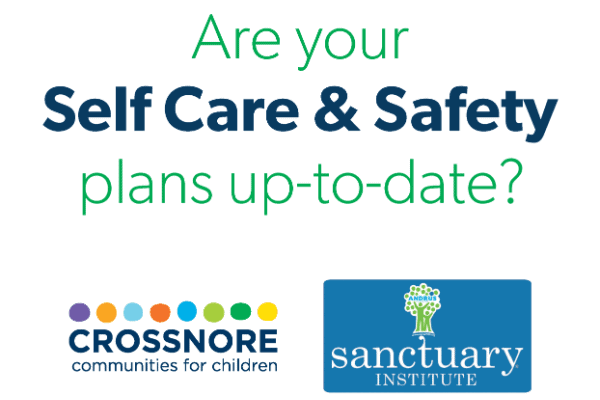There are many steps that go into a clinical intake for clients enrolled in Crossnore’s therapy services. The final step for enrollment is to create a safety plan. Because Crossnore adheres to the commitments to the Sanctuary Model – not only do all of our clients have a safety plan in place, all of our employees have one as well. So what is a Safety Plan and why do you need one?
What is a Safety Plan
What exactly is a safety plan? And could you benefit from having one? We definitely think so.
Dr. Sandra Bloom, one of the Sanctuary Model creators, shares that “in the Sanctuary Model when we use the word “safety” we are referring to four all encompassing domains of safety: physical, psychological, social and moral.” She further shares “For our brains to think rationally and act appropriately we must feel safe with each other and safe within our organizations.”

“In Sanctuary, every person – child and staff – must develop Safety Plans for themselves. These plans should be simple and straightforward and provide options for at least five immediate steps that can be taken as soon as the individual finds himself in a stressful, challenging, or dangerous situation. Safety Plans can and should be progressive in nature so that each individual is developing an increasing level of skills that rely on his or her own resources and do not necessarily depend on anyone else.”
Questions to Formulate Your Safety Plan
We ask our staff to create their own safety plans during their employee orientation. We encourage them to keep these plans readily available throughout the week. To assist with creating safety plans, we pose several open ended questions:
Why do I need a Safety Plan?
What might I do or what have I done in the past when I’m very upset? (Such as attempting or threatening suicide, physical aggression, etc.)
Identifying My Stressors
What are the events, actions, or other things in my life that may increase my stress? What are the things that make me very upset? (e.g., Anniversaries, holidays, noise, change in routine, health problems, re-enactment, etc.)
What are my warning signs?
How will I know when I am getting very upset? How will others know when I am getting very upset? (Such as isolating myself, tightness in chest, cursing, etc.)
What are my early coping/prevention strategies?
We identify at least five things the person can do to manage emotional distress in stressful, challenging, or unsafe situations. The individual names two ways they can ask for help in managing emotions. And three things that the person can do anytime, anywhere without embarrassment and without help. Then, we transfer these five things to the person’s safety plan card. We use this card as a physical reminder of coping skills that work for them in challenging times.
Safety Plan Accountability
During staff supervision meetings, employees are also prompted by supervisors. They ask, “What worked on your safety plan this week?” Some staff translate this question to mean, “How did you take care of your emotions when you were dysregulated this week?”
Some typical answers shared by the Avery clinical team include: Music, going for a walk, hanging out with the facility dog, Yona, calling a friend, lunch with coworkers, going for a drive, having a laugh with co-workers, taking the afternoon off, meditating, calling a spouse, calling a supervisor for support, going to the gym, having a scream, having a cry, going to see the goats, going to get a coffee, writing a strongly worded letter and throwing it away, having a snack, taking three deep breaths, playing with stress balls, and meeting in the lobby to debrief before heading into the next meeting.

Developing Your Own Plan
So, when you think about what helps you when you’re feeling stressed, ask yourself this question: What are five things I can utilize in the moment to assist with regulating my emotions to keep navigating through my day?
Thank you to the Avery Clinical Team, MKayla Nelson, LCSWA, Donna Ratcliff, LCSWA, Shelby Jones, LCSWA, Meagan McGinnis, MSW Clinical Intern, Karen Mehri, MFT Clinical Intern, and Rylee Rosenthal, CMHC Clinical Intern, for utilizing your safety plans each week and being a vital part of my own safety plan! As always, I am honored to work alongside such talented and dedicated clinicians.



